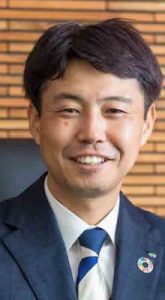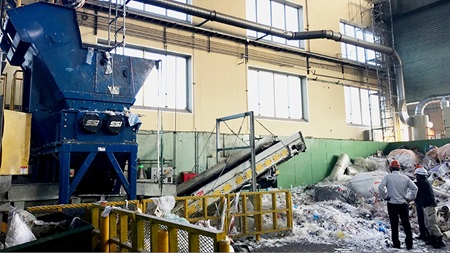Toyokawa, Japan-based “Kayama Kogyo” is described by one of its technology suppliers as using innovative recycling techniques, educational outreach, and partnerships abroad to help it evolve from a waste processor to “a guardian of environmental sustainability” involved in numerous recycling and landfill diversion activities.
According to Wilsonville, Oregon-based SSI Inc., Kayama Kogyo was founded in 1951 after Isao Kayama “witnessed the incredible amount of trash generated by Japan’s postwar industrial boom.”
While concerned, he also saw an opportunity and founded Kayama Kogyo as a waste handling and management firm.
Today, Junichiro Kayama (Right Image), Isao’s grandson, manages the company as CEO and tells SSI the firm now sees it as a responsibility to adapt to increasing environmental concerns.
firm now sees it as a responsibility to adapt to increasing environmental concerns.
“Incinerating and landfilling is no longer enough,” says Junichiro Kayama. “We need to recycle and reduce the amount of waste going to landfills.”
The company’s facilities process a wide range of materials from industrial and construction byproducts to copper wire and scrap wood. Materials are sorted and processed to create marketable metals and paper grades and a refuse-derived fuel (RDF) product consisting largely of paper and plastic.
Currently, 80 percent of Kayama Kogyo’s incoming material is recycled, according to SSI, while the remaining infeed, including some hazardous materials, are incinerated in an in-house system.
“We are doing everything we can to make that figure 100 percent,” says Junichiro Kayama of his current 80 percent diversion rate.
Kayama Kogyo operates three SSI shredders and has been a customer of the firm for 12 years. Two dual-shear shredders, an M120 model and a larger M140, break down incoming industrial and construction materials to improve the metering to downstream sorting equipment.
A Q100 four-shaft shredder at Kayama’s new facility provides both a primary shred and uniform particle size reduction efficiently in one machine, says the equipment firm.
According to SSI Asia Sales Manager Rich Ellis, that unit takes on “mainly plastics, such as fishing nets, fiber cable, woven plastics and super sacks.”
Ellis says the Q100 is the right machine for the task because “It can process these difficult materials in one step with the most efficiency. Other equipment either cannot process the material or cannot cut the material to size without multiple steps.”
When asked why he has opted to use SSI brand shredders in his facility, Junichiro Kayama points to similarities between SSI and his company that created a natural partnership. “We do our best to innovate, and we felt that SSI was similar in always innovating and improving their shredders,” says Junichiro Kayama.
In addition to a shared dedication to innovation, SSI also provides Kayama with an ability to maintain production as its inbound materials stream changes, says the CEO.
“There are more and more materials that are hard to shred [and they] continue to increase,” says the waste executive. “After extensive research, we came to the conclusion that the SSI shredders were the best units for difficult material.”
In addition to raising its recycling and diversion rates, Kayama Kogyo demonstrates other ways to show its commitment to protecting the environment, including by installing a beekeeping project at its incinerator facility.
“Bees are an indicator species; pollutants in the surrounding environment are detectible in their honey,” says the company. To study the impact of its incinerator, Kayama has the honey produced tested for contaminants. To date, according to SSI, the honey continues to test free of any pollutants.
The company’s mascot, a dinosaur character named Torano san, appears on local television programs to educate children on how to reduce waste and the impacts of recycling.
Kayama Kogyo also supports the United Nations’ Sustainable Development Goals (SDGs), providing speakers to companies and universities on sustainable recycling practices.
The firm also offers its expertise to assist countries still developing their waste disposal infrastructure. In Laos, Kayama Kogyo has partnered with local companies in what it considers the effective and safe management of hazardous materials.












